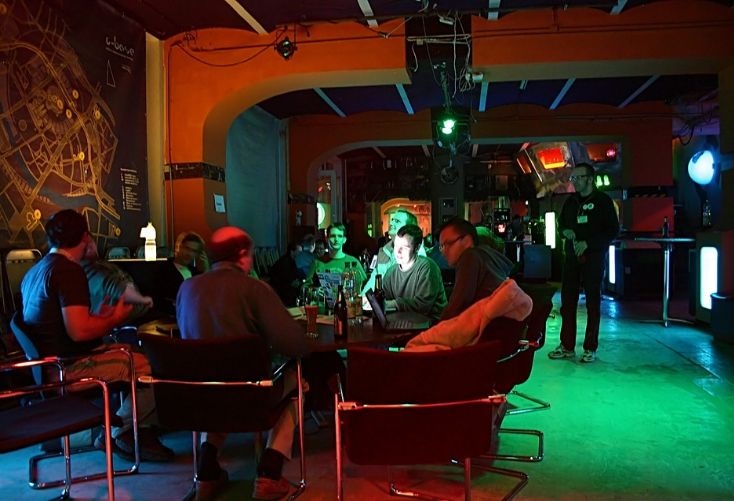- A hackerspace is a flexible workspace designed for people who are interested in the same thing – namely technology.
- It’s one of a growing list of flexible space variations, which is indicative of the sector’s growing reach and appeal.
- Unlike most coworking spaces, hackerspaces are not-for-profit organisations that are used for “extra-professional” projects.
Hackerspaces, makerspaces, incubators, coworking spaces… the list of flexible space variations seems to be getting longer by the day, and is indicative of the sector’s growing reach and appeal.
Like coworking, a hackerspace is a physical venue that people go to in order to think, work and create. In some ways it’s very similar to a niche coworking space in that it is specifically designed for people who are interested in the same thing – namely technology.
But unlike most coworking spaces, tech incubators and accelerators, hackerspaces are not-for-profit organisations. They’re also not designed to be used as a full-time workspace solution, but as a space for “extra-professional” projects.
Makerspace vs Hackerspace
Makerspaces and hackerspaces are different beasts, although people sometimes use the two terms interchangeably. This confusion is completely understandable; after all, the flexible space industry itself is still in its infancy so its definitions are evolving.
Most people today concur that a makerspace is the same as a coworking space – but for people who make tangible things. Typical makerspace members include carpenters, metal workers, textile technicians, ceramicists, and so on.
Allwork.Space recently paid a visit to Blackhorse Workshop, a prime example of a makerspace in the heart of a regeneration zone in East London. Makerspaces have the flexibility of a coworking space and offer a variety of membership types to suit the individual.
Hackerspace Definition
The word “hack” can have negative connotations – we often associate it with illegal online activities such as identity theft. But the “hack” in hackerspace is synonymous with verbs like invent, innovate and experiment.
A hackerspace (also known as hackspace or hacklab) is a place in the community where programmers, coders, developers or anyone with a keen interest in tech can meet, work, share skills and engage in creative problem solving. It is a community-orientated and not-for-profit concept, so memberships are cheap and sometimes free.
Hackerspaces lend themselves to collaborative projects because members have their own unique specialisms and skill sets. Members tend to work in tandem on projects such as designing and developing a product that solves a real life problem, such as an app.
A hackerspace specialising in AR technology might have experts in programming, software development, engineering, design, gaming, coding and more. In other words, they are a real “open source” of knowledge and can be a great educational tool.
The History of Hackerspaces
Experts believe the hackerspace movement began in Germany, with c-base being recognised as one of the first hackerspaces in the world. The association was founded in 1995 by 17 people and in 2002 and 2003 the BerlinBackBone project was launched to promote and provide free public access to the Internet via wireless community networks.
Today c-base is engaged in a number of projects, including the Berlin Wikipedia Group, the Chaos Computer Club and the Chaos Communication Camp – an international meeting of hackers that takes place every four years.

In the mid-noughties a group of North American hackers visited Germany for Chaos Communication Camp. Motivated by the possibilities of having similar spaces in the United States, they founded hackerspaces NYC Resistor, HacDC and Noisebridge.
You’ll find hundreds of hackerspaces across six continents today – many of which are listed here.
The Rise of the Hackathon
Also referred to as a hackday, hackfest or codefest, the goal of a hackathon is to work with others to create a functioning piece of tech by the end of the event. Hackathons tend to focus on a specific area. For example, the MEC Hackathon 2019 is “designed to test your skills and abilities as a Multi-Access Edge Application developer.”
Some hackathons don’t put restrictions on the type of software being created.
As with hackerspaces, the types of professionals you’ll find at tech hackathons include computer programmers, interface designers, project managers, and many, many more. Check out this video of Bosch Software Innovations’ event.
“The teams are actually not working against each other; everybody’s collaborating… we all want to contribute to solve the challenge.” – Best of Bosch ConnectedExperience 2019, IoT Hackathon.
Hackathon expert Joshua Tauberer has created a useful and informative guide on how to run a successful hackathon. In it, he explains that these events have sometimes “gotten a bad rap” due to their competitive nature and unrealistic expectations.
He believes that a successful hackathon will seek to “provide a space and a time for participants to make headway on problems they are interested in” and “strengthen the community that the hackathon is for”.
Are you a hackerspace member? Send images of your projects or space to [email protected] and we’ll share them on social media.



 Dr. Gleb Tsipursky – The Office Whisperer
Dr. Gleb Tsipursky – The Office Whisperer Nirit Cohen – WorkFutures
Nirit Cohen – WorkFutures Angela Howard – Culture Expert
Angela Howard – Culture Expert Drew Jones – Design & Innovation
Drew Jones – Design & Innovation Jonathan Price – CRE & Flex Expert
Jonathan Price – CRE & Flex Expert











